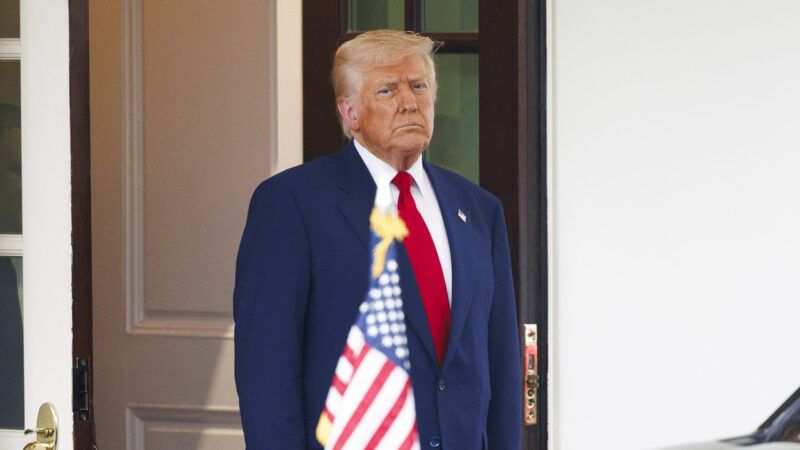Whiplash
Plus: Rat buffet, critiquing the abundance agenda, arson at the Pennsylvania governor's mansion, and more...

Trump's exceptions keep getting reversed: President Donald Trump just can't make up his mind about which Chinese products will have tariffs applied to them upon crossing our borders.
All last week, Trump and Chinese President Xi Jinping engaged in a tit-for-tat trade war escalation. On Friday, the Trump administration made tariff exceptions (but don't call them that?) for smartphones, semiconductors, computers, and other tech goods (modems, routers, flash drives, and the like), signaling that they'd be subject to the lower 20 percent tariff versus the much higher 125 percent ones. (The 125 percent tariffs aren't as universal as it had seemed like they would be last week—and the administration has been oscillating between claiming the total tariff amount is 125 percent and 145 percent. The actual category breakdown is here, with tax amounts that vary substantially. And the electronics tariffs exemptions apply to all imports, not just Chinese ones.)
Reason Roundup inline form
The Reason Roundup Newsletter by Liz Wolfe Liz and Reason help you make sense of the day's news every morning.
Trump says no tariff "exception" was announced on Friday pic.twitter.com/0h4qFZti6j
— Joe Weisenthal (@TheStalwart) April 13, 2025
Then, over the weekend, the administration signaled that semiconductor chip tariffs would be announced separately, and might be larger. "We wanted to uncomplicate it from a lot of other companies, because we want to make our chips and semiconductors and other things in our country," the president told reporters aboard Air Force One. "We are taking a look at Semiconductors and the WHOLE ELECTRONICS SUPPLY CHAIN in the upcoming National Security Tariff Investigations," he posted on Truth Social. Then, Commerce Secretary Howard Lutnick made the cable news rounds on Sunday, saying that these electronics—laptops, phones, etc.—will not be excluded from tariffs long-term, just that those specific categories will be announced at the same time as the semiconductor tariffs, in a month or two.
This about sums it up:
Sentiment check: The biggest rally of the year would come on the day Lutnick gets fired.
I suggest the administration figures out who controls the message, whatever it is,
as it changes every day.
US business can't plan or invest with the constant back and forth. pic.twitter.com/d78bwFBLMO— Sven Henrich (@NorthmanTrader) April 13, 2025
Also, this:
WHY TARIFF BANANAS? pic.twitter.com/ayXpjBbUpY
— Armand Domalewski (@ArmandDoma) April 12, 2025
(Keen observers might recall that Reason has been on the banana-tariff beat for a minute.)
"President Trump has made it clear America cannot rely on China to manufacture critical technologies," said White House press secretary Karoline Leavitt on Saturday, so companies "are hustling to onshore their manufacturing in the United States as soon as possible." But onshoring manufacturing is easier said than done (and, for semiconductors at least, moves were already made with the passage of the CHIPS Act several years ago). It will take years to build out that type of capacity—and a lot of the parts we'd need to build the factories that come from…China. How exactly will this happen?
Scenes from New York: I just got a notice in the mail that the city will be fining residents if they fail to compost. "Residents across the five boroughs are now required to separate their food scraps and yard waste from their garbage or face penalties ranging from $25 to $300 for each infraction," reports The New York Times. An incredible idea from a city that has a massive rat problem and issues with even basic provision of public services. (Or, looked at differently: What a creative cash grab.)
Day 1 of NYC's composting mandate and I received an image where a super was sorting the non-recycled trash (in order to remove compostable material) and he encountered a used needle.
Supers should not be forced to dumpster dive through tenant trash.
Building owners can provide… pic.twitter.com/SxB1FfSc59
— Kenny Burgos (@KennyBurgosNY) April 1, 2025
QUICK HITS
- Last week, Zach Weissmueller and I spent some time sparring with The Atlantic's Derek Thompson, who—along with The New York Times' Ezra Klein—has written the book Abundance, which aims to provide a new framework for what Democrats ought to prioritize. We agree on a fair bit, but I remain skeptical that the modern Democratic Party is a good vehicle for this, and Zach pushed back on Thompson's definition of public goods as well as what types of infrastructure projects ought to be funded by the state:
- I want to be extremely clear: Working in a factory sounds bad.
"America would be better off if more people worked in manufacturing."
• 80% of Americans agree
• 20% disagree"I would be better off if I worked in a factory."
• 25% of Americans agree
• 73% disagree
• 2% currently work in a factory???????? https://t.co/ycnHVZ1gT1 pic.twitter.com/4NXb0GLK5L
— Frank Luntz (@FrankLuntz) April 13, 2025
- Hundreds of thousands of Cuban migrants came into this country via temporary humanitarian parole programs, which may now be revoked under President Donald Trump. Estimates vary, but this Bloomberg piece which relies on statistics from the Center for Engagement and Advocacy in the Americas says up to 500,000 Cubans could face deportation.
- An arsonist set fire to Pennsylvania Governor Josh Shapiro's residence in the middle of the night over the weekend. (No one was killed, fortunately.) We don't know much about the arsonist's motives yet, but it certainly looks like another worrying case of political violence.
- How ballooning insurance costs are affecting the nightlife industry and causing club closures. (Relevant discourse.)
- Mario Vargas Llosa, the Nobel-winning Peruvian novelist, has died. Vargas Llosa was a vocal advocate of classical liberal politics; you can read his articles for Reason here.
- Sen. Bernie Sanders (I–Vt.) made a surprise speech at Coachella, the extremely expensive music festival in southern California (ticket price minimum, $500), urging attendees to fight for "economic justice."


Show Comments (390)